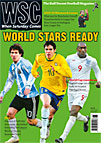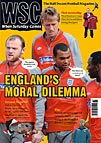 Dear WSC
Dear WSC
So, following Man Utd’s exit from the Champions League at the hands of Bayern Munich, Sir Alex Ferguson saw fit to make the following comment regarding players influencing a referee, in particular to getting an opponent dismissed: “They got him sent off – everyone ran towards the referee. Typical Germans”. I couldn’t help but think back to Derby v Man Utd at Pride Park in the late 1990s and an incident I witnessed just yards from where I was sitting. I distinctly remember Gary Neville instructing the referee, Mike Reed, to send off Derby’s German defender Stefan Schnoor for a foul he had committed shortly after having already received a yellow card. Reed had walked away and wasn’t going to take further action until United’s players forced him to change his mind. To double check my memory I found the following match report on the Independent’s website for the match on November 20, 1999: “Stefan Schnoor, admittedly, invited his own dismissal, ploughing through Dwight Yorke in the 40th minute after being cautioned for dissent moments earlier. What enraged Derby was that when it seemed Mike Reed was undecided about a second yellow card, and the automatic red, David Beckham and Gary Neville ran over in an apparent attempt to pressure the referee into banishing the defender". It’s a bit of an irony, isn’t it, Man Utd’s English players talking a referee into sending off a German. Perhaps, if this behaviour is “typically German” in 2010, they are just emulating the behaviour of English players in an English team, Manchester United, who have been practising it for over ten years.
Andy Kitchen, Derby
Search: ' Lazio'
Stories
 Events on the pitch in Italy were overshadowed by a bribery scandal involving several top clubs. Matthew Barker looks back on a memorable season in Serie A
Events on the pitch in Italy were overshadowed by a bribery scandal involving several top clubs. Matthew Barker looks back on a memorable season in Serie A
The long-term significance
The fallout from the Calciopoli bribery scandals has yet to settle, with a number of phone-tap recordings surfacing in recent months. Inter, at the centre of new (unproven) accusations, are under increasing pressure to relinquish the 2005-06 Scudetto, awarded to them after it was stripped from Juventus. The bianconeri’s title from the 2004-05 season stands in the record books as void. The original sentencing was announced on July 14, 2006, less than a week after the Azzurri lifted the World Cup in Berlin. Of the top-tier clubs involved, Juventus were sent down to Serie B with a nine-point (originally 30-point) deduction for the following season. Lazio and Fiorentina’s points deductions were increased on appeal, from seven to 11 and 12 to 15 respectively, though both original punishments had included demotion to the second division. Reggina were deducted 11 points (originally 15), while Milan were docked eight (44) and, following an appeal, allowed into the following season’s Champions League, which they then went on to win.
 A change of attitudes in Italy could provide some useful lessons for football's oldest tournament. Matthew Barker explains
A change of attitudes in Italy could provide some useful lessons for football's oldest tournament. Matthew Barker explains
Much has been made in the press recently about falling attendances in the FA Cup, with concerned reports warning that the grand old competition is on the wane, its status increasingly devalued as an unloved irritant for clubs who prize the Premier League above all else. The temptation is to draw a parallel with its continental counterparts, the Coppa Italia and Copa del Rey.
 With recent controversy surrounding English clubs signing Europe's young talent before they turn professional, Neil Rose looks at FIFA's plans to protect Europe's schoolboy stars
With recent controversy surrounding English clubs signing Europe's young talent before they turn professional, Neil Rose looks at FIFA's plans to protect Europe's schoolboy stars
The furore over French teenager Paul Pogba – with Le Havre accusing Man Utd of stealing him – is just the latest controversy thrown up by English clubs signing the cream of foreign youth. United insist that they complied with UEFA guidelines in signing the 16-year-old and the row is reminiscent of that caused by their capture of Federico Macheda from Lazio in 2007, or Arsenal’s of Cesc Fàbregas, or several other players, mainly by the Big Four. Of course, signing players before they can pen a professional contract is not just an English pursuit – French clubs themselves have plundered Africa for a stream of young players. With transfer fees spiralling ever higher the appeal of relatively cheap, if raw, foreign talent is growing.
 Neil Rose looks at a ruling which looks to have given clubs some power back from the players
Neil Rose looks at a ruling which looks to have given clubs some power back from the players
When Andy Webster used an obscure FIFA rule to buy himself out of his contract with Hearts for a relatively nominal sum and then sign for Wigan, it was seen as a contract-breaker’s charter. But a recent ruling involving Brazilian Matuzalem appears to have restored some balance in the never-ending power struggle between players and clubs.